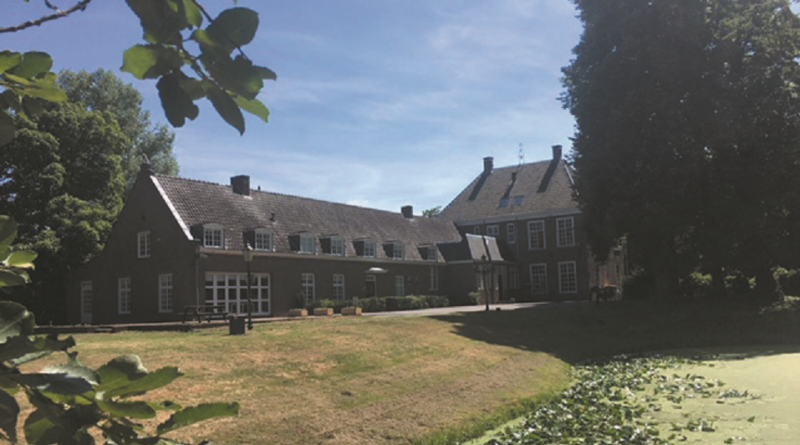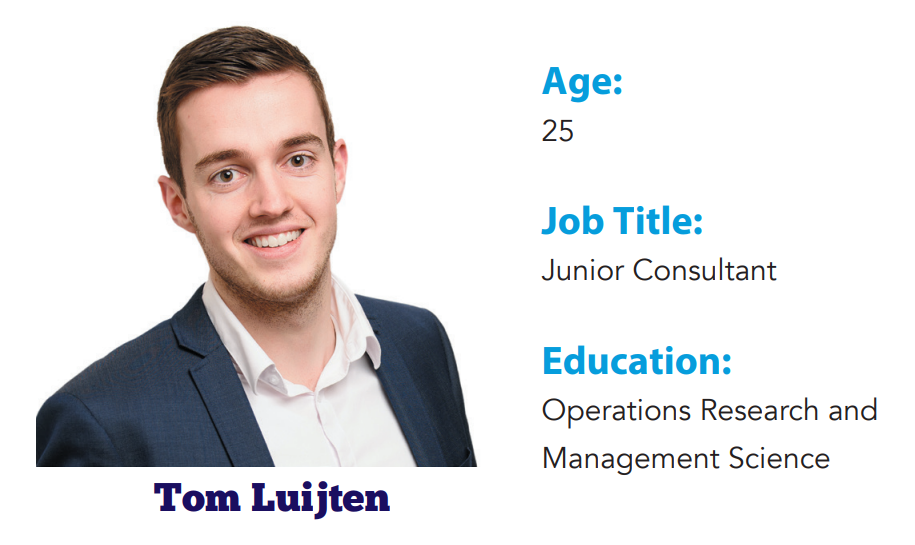Quantics: Conquering the World of Quantitative Consultancy
On a typical, not too cold blue Monday, Anouk Verhagen and I traveled to a fairytale-like estate in the peripheral area of North-Brabant’s beloved capital. Upon arrival, we traded our state of ultimate comfort in the seats of our grey Opel Corsa, a true piece of Germany’s finest engineering and craftsmanship, for a short walk over typical parking lot gravel. We were about to find out more about a young, dynamic company and how they use the best the Netherlands have to offer in order to serve their clients and achieve great results.
Text by: Dominique Bavelaar
With “the best” I mean econometricians, just like you are. Tom Luijten is an econometrician from Tilburg University as well and he took the time to give us an insight in his daily life at Quantics and what the company has to offer. Tom graduated last year and within two weeks after graduation, he entered Quantics: “I did the Operations Research and Management Science master (the old name of BAOR) and after my studies, I got into contact with Dorien de Boer, who is the founder of Quantics. Though I did the ORMS master, I was not really convinced that I wanted my job to be only covering topics in that field,” Tom explains. “For example, I also liked subjects like Life Insurance, so I wanted to have some diversity in the projects I would do and a somewhat broader set of responsibilities.”
This is exactly what Dorien could offer Tom. His job title is Junior consultant and, even though that title may suggest otherwise, he is granted a lot of freedom and responsibilities to let his talents flourish, and the company with it. Quantics offers its employees the opportunity to take trainings and (online) courses in various topics. Tom: “The first few weeks after I joined Quantics, I took a lot of those courses in order to refresh and extend my knowledge”. And these were not only the soft skills or management trainings a lot of other companies offer as well: “I also followed programs which dive deeper into topics I came across with during my studies as well, like machine learning and data science.“ This kind of trainings can be offered, because every single employee in this company is an econometrician, except for Dorien. This makes it very easy to share knowledge among each other and the consultants can advise each other in an efficient way, since they have a shared language. Quantics is also quite a small company with only seven fulltime employees, so you can really make an impact right from the start of your career. Of the seven employees, there are six econometricians, one of which- the senior– has a lot of experience; the rest is about Toms age.

As usual in similar NEKST articles, we also asked what a typical day at Quantics looks like and as expected we get the answer that there is not such a thing as a “typical day”, but Tom tries his best to tell enough about his job until we make a satisfied impression: “The work you do really depends on the project you are working on. Currently I am doing a project at ING, where I monitor and analyze market risks in the bank’s trading portfolio, using data science methods. For this, I work at their office in Amsterdam in a team with guys from all over the world and from all kind of backgrounds. From econometrics and physics to finance or economics. Most of the time I work together with the more quantitative guys, but it is important to also be able to explain your solutions to the rest of the team and the management.” A bank like ING is, indeed my dear critical reader, not the kind of company you would expect to find an ORMS graduate enjoying his lunch and work. Tom: “The fact that the projects at Quantics are so diverse is something I really like. I still use the techniques and knowledge I obtained during my studies, but I am able to apply them here in a lot of different fields. A colleague of mine is, for example, now working an optimal operational strategy for car lease company Athlon.” Quantics also asks you, as soon as you are employed, what other kind of responsibilities you would like to have next to your consultancy projects. For example, Tom manages the company website, even though he did not have any clue about web design whatsoever before entering Quantics: “You learn new skills really fast since you start your first project right after the training phase,” Tom elaborates, “There is continuous feedback from and between other consultants, so if someone gets stuck, we can help each other out as well.”
Quantics’ employees work 90% of the project duration on location, in Tom’s case the ING office in Amsterdam. Two days a month Quantics consultants have an office day on which they all meet each other on the castle office, which is located in Vught, in order to share their experiences. And now I hear you thinking: Well, well, well, that all sounds nice and stuff, but traveling from Amsterdam to a castle Vught is quite hard by train, right? – Not the slightest problem for Tom and his colleagues, since they get a car from the company. This also means that it is not necessary move temporarily to an expensive city like Amsterdam, in case you should have to work there for a while. Tom, for example, lives in a moderately big town near Breda with his girlfriend.
Sounds nice again, but how should a small young firm like Quantics be able to compete with huge players in the consultancy field? Tom: “It is true that big companies often have contracts with the larger consultancy firms about provided services. However, since Quantics offers a really quantitatively orientated collection of econometric specialists, we have the expertise they need for projects involving a huge amounts of data.” That is also why Quantics gets more and more project requests, for which they also need more manpower. However, they aim to grow responsibly and the new employees they hire should fit in the team and company: “We do not want more than say 30 consultants in the company, but it is hard to put an exact number to this,” Tom explains, “The consultants we want should have a basic talent for explaining complex solutions in an understandable way to our clients. Of course, you learn the soft skills you need for this along the way, but you should not be afraid to speak up and ‘sell’ your solution.”
Data science with a quantitative, human twist within a company with high, yet realistic ambitions, that is what Quantics can offer young econometricians.
We would like to thank Tom for the time he took to give us a premium insight in what working at Quantics looks like. In case you want to know more about Quantics, do not hesitate to visit quantics.nl.






